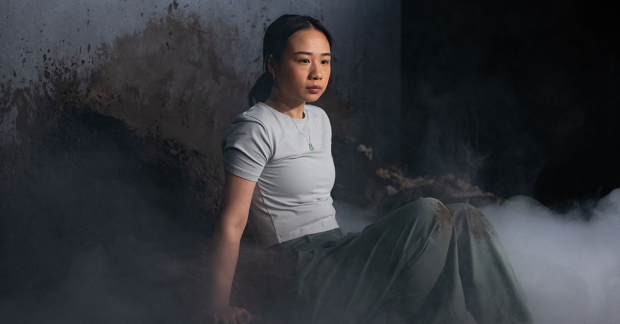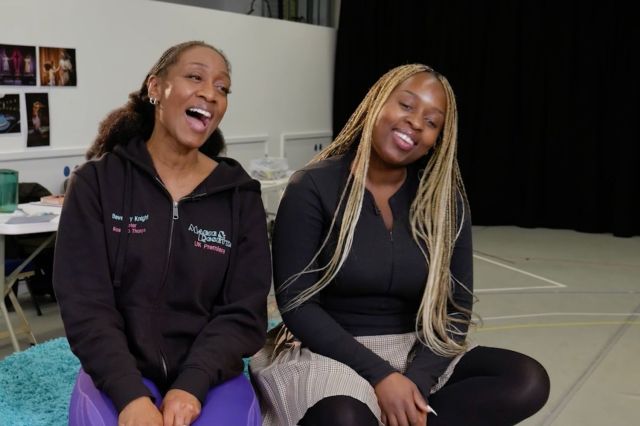”Graceland” at the Royal Court – review

© Ali Wright
When Sabrina Wu enters the stage in the Royal Court’s upstairs space, she is visibly weary, surveying the audience on either side of her with palpable concern. She treads a dirt-laden path to a made bed and readies herself to deliver the post-mortem of a doomed relationship. With both hands on the wheel of a 75-minute monologue, she starts at the beginning.
Wu plays Nina, a young woman whose cuticle-biting upbringing has taken place in her parents’ Chinese restaurant. The unseen boy she describes in forensic detail is referred to largely as ‘you’ and fate (or rather, playwright Ava Wong Davies) introduces them at a mutual friends’ barbecue. What follows is the roadmap for a familiar love story, only what should be a lush, romantic hue is painted with an unease instilled by Wu’s unshifting, mournful expression.
The juxtaposition of early love with the context suggested by Wu’s demeanour positions the audience as detectives, looking for clues ahead of an inevitable breakup. Soon enough this comes into focus: Nina’s boyfriend is from a wealthy family and their perspectives on money, ambition and family are irretrievably different. If there are any red flags in their first meeting however, they aren’t waving – he’s an unashamed poet, an attentive conversationalist and, later, respectful of intimate boundaries. These details make this story perhaps even more important, an exploration of how the behaviour of seemingly ordinary people can be infiltrated with abuse.
With speech shifting between the present and perfect tense, and often addressing her paramour directly, the script often feels like a novel that has undergone limited adaptation. Directors Anna Himali Howard and Izzy Rabey craft powerful imagery but elicit little atmosphere from Wu’s performance of the monologue itself with their delicate approach. While it feels correct that Wu’s Nina wrestles with an emotionless self-preservation, the stoicism of her delivery inhibits the piece’s theatricality, her voice does not adapt when she recalls the words of other characters and humour dies on her lips. When comic asides arrive as an occasional gift, they earn a stifled chuckle – admittedly funny but it doesn’t feel as though we’re meant to be laughing.
Mydd Pharo’s set is a metaphorical triumph, familiar either of a post-apocalyptic video game or an average student house, depending on your lived experience. This sets the stage (literally) for some striking visuals, when Wu returns to the clean central platform from the mounds of dirt surrounding it, she tracks a path of distinct footprints, the stains of repressed problems which eventually prove to have been ever-present. This, in conjunction with a skylight that bathes her in alternately cool and warm light, from lighting designer Jai Morjaria, is rich indeed.
If much time is spent studying the details of the set, it is because the play occasionally resembles an endurance test for the wrong reasons. If it challenges its audience, it ought to be because of its turbulent subject matter and not because they have to dedicatedly maintain their focus. Davies asks urgent, contemporary questions and if Nina’s most heart-wrenching and personal admissions were sandwiched between more substantial plot points, they’d likely prove more engaging. With this, her character would be more compelling and the play ultimately stronger for that.












